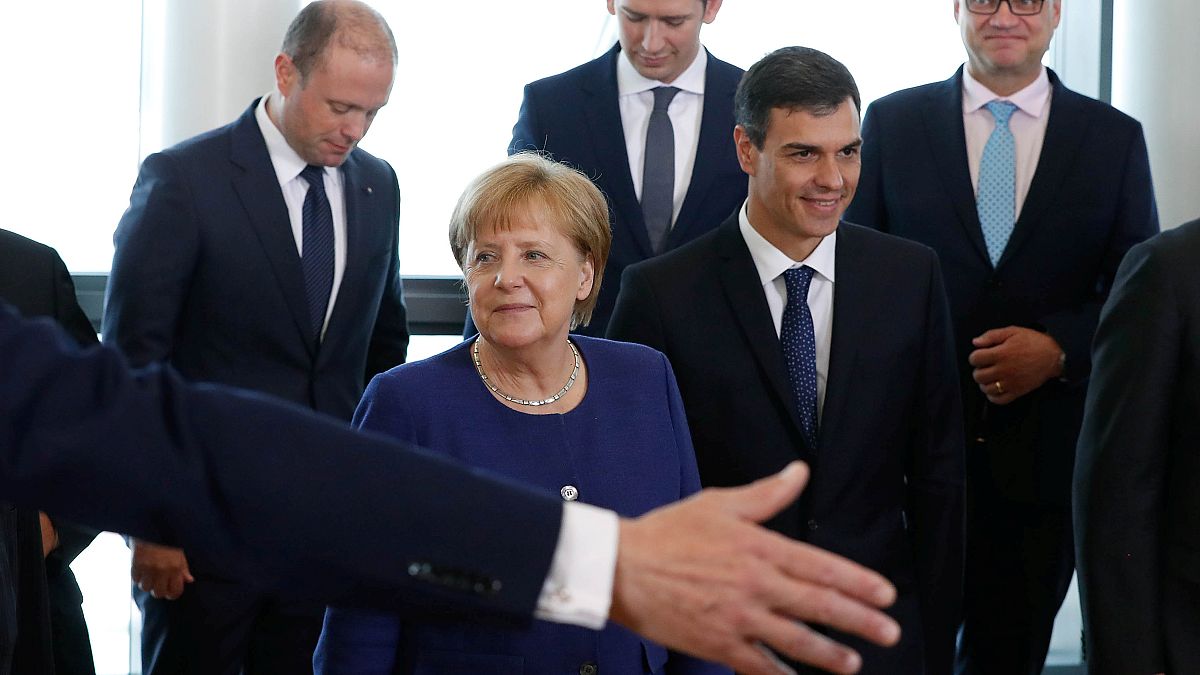Euronews Brussels correspondent Bryan Carter assesses the situation ahead of a crucial summit.
Why is migration such a hot issue right now?
Italy’s new far-right interior minister brought the issue at the forefront of the debate by refusing the migrant rescue ship Aquarius the right to dock in Italy and saying he will not accept more migrants in his country, which is their main landing point.
The other reason is the political challenge Merkel is facing at home from her interior minister from her coalition partner the CSU, who is himself fearing the rise of the far-right AFD in his powerbase of Bavaria. He pressured the chancellor into an ultimatum to find a solution on migration, therefore challenging her so-called open-door policy. Germany is one of the most popular destinations for asylum-seekers after they made it to Europe.
So obviously, the rise of far-right parties is pushing migration to the top of EU's agenda and even more to the right, even though the number of migrant arrivals have sharply declined this last year and that we are far away from the 2015 crisis.
What are the possible answers?
Many now agree with the need to close borders to potential refugees by externalizing the issue to other countries, in the same way they have done with Turkey, Libya and other African countries. And with Austria, whose government is fiercely anti-immigrant, taking over the next rotating presidency of the European Council, you can’t expect a change in priorities anytime soon.
It does get more complicated though when we talk about asylum-seekers moving inside the EU, the need to reform the Dublin regulation on asylum application or the Common European Asylum System, where you see stark differences between member states.
Which countries stand where?
Spain, Malta, but especially Greece and Italy, are at the forefront of the migration route and have long pushed for the reform of the Dublin regulation, which states that the first country of entry should be the country examining the asylum application. This regulation, they say, puts an extra burden on them.
But that doesn’t mean that they necessarily agree amongst themselves or are opposed to other member states. We saw it when Spain welcomed the Aquarius with open arms after Italy refused it. Italy would like asylum-seekers in Europe to be ‘shared’ amongst member states, something Germany actually agrees with.
But some countries like Austria, Hungary, Poland, the Czech Republic and Slovakia don’t want to hear about it.
France, Germany or Spain agree that the system should be fixed but that it should be a common European solution: meaning will all member-states involved. They want refugees to be more evenly recognized across Europe, but France, in particular, is not too keen on opening its doors any wider, as we saw with the country's silence on eventually welcoming Aquarius, because far-right populism is on the rise everywhere in Europe.
How do Europe's citizens see the issue?
A poll indicated that 7 out 10 Italians support Matteo Salvini’s policy on migration. But about the same percentage of Germans also support Angela Merkel’s claim that European countries should find a solution together. Which could be read either way in fact, meaning that Germans also want the other EU countries to do more in order to relieve the pressure on them.
In France, nearly 60% of the people are opposed to receiving migrants from Italy and Greece and an even bigger proportion agree that the Aquarius should not have docked in France.
So while we can expect some countries like France, Germany, Spain and generally pro-EU governments to stick together, against those for example in the Visegrad group who are clearly hostile to refugees and migrants, at the end of the day, virtually all member-states think about their national interests first, want to push back irregular migration and externalize asylum applications.


